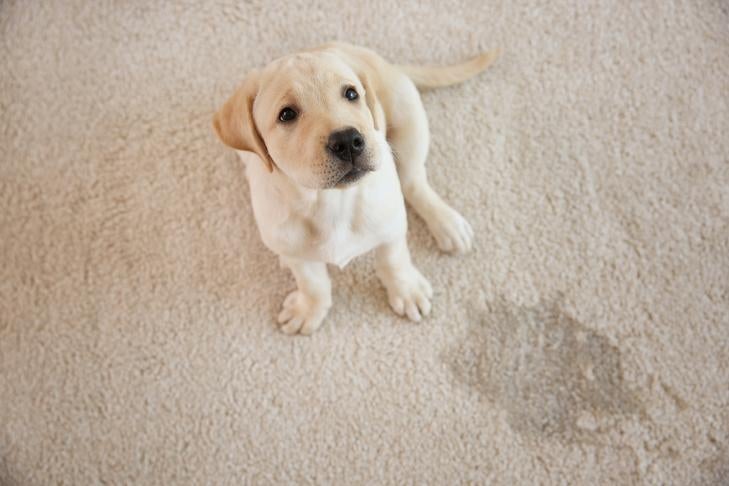How To Get Puppy To Stop Peeing Inside
So, you've potty trained your puppy. You take them outside for walks and let them out in the backyard for bathroom breaks. And your puppy is happy to do their business outside. That should be that, right? But your puppy keeps peeing in the house. Why? It's probably one of two common reasons. Either you didn't actually potty train your pup or you gave your puppy too much freedom too soon.
New dog owners often expect their puppies to housetrain in an unreasonably short amount of time and with little effort. Potty training a puppy is a step-by-step process that can take several months or more. The key to successful potty training is to prevent all accidents and make sure your puppy only goes to the bathroom in the appropriate toilet spot. That takes patience and perseverance.
Don't Ask Your Puppy to Hold it for Too Long
Remember, puppies can't control their bladder until they're about 16 weeks old. After that, in general they can only hold their bladder for the same number of hours as the number of months of their age plus one. So, a four-month-old puppy can only hold it for five hours. Expecting your puppy to wait too long for a bathroom break will lead to an accident.
You need to take your puppy to the correct toilet area at least as often as they will need to go. Otherwise they will be forced to go in the house or inside their crate or safe area. If you can't be home to take your puppy out, you can use potty pads to give them an indoor toilet, but that might delay the entire housetraining process by giving them two options instead of only one. A better solution would be to hire a pet sitter or ask a friend or neighbor to let your puppy out as often as needed while you're away.
Don't Ignore the Signs
So, if your puppy can't hold it for long, you need to provide adequate trips outside. But how do you know when your puppy has to go? Look for behavior like sniffing, circling, or hunching the back. As soon as you see a pre-potty signal, get your pup outside as soon as possible. Then heavily reward your puppy for doing their business in the right place. The more times a puppy gets a reward for going outside, the faster the puppy will understand that it's worth their while to wait to go there.
It's also important to know the times your puppy is most likely to need a bathroom break. Puppies need to go at predictable times, such as after they eat or drink, when they wake up, and after a bout of playing or exercise. If you can anticipate their needs rather than waiting for the signals, you're less likely to miss your chance to get them outside. It also helps to have a puppy potty routine so you can foresee when those times are coming.

Don't Take Your Eyes Off Your Puppy
Puppies need to learn where not to go just as much as where to go, so you must also prevent your puppy from going in the wrong place. They might know the yard is appropriate, but if they don't know the living room isn't, you won't make any progress. Remember that every time your puppy has an accident, they get the reward of an empty bladder.
Therefore, it's vital you supervise your puppy every time they aren't in their crate or safe area. It's not enough to have your puppy in the same room. You need to watch your pup's every move. Otherwise it's too easy to miss the warning signs that your puppy needs to go out.
Don't Give Your Puppy Too Much Freedom Too Soon
Supervision is also important as you allow your puppy more freedom in the house. Dogs don't generalize well. They may understand that the kitchen isn't a toilet area, but that isn't going to automatically translate to the rest of the house. You need to teach your puppy how to behave one room at a time.
Allow your puppy to learn potty behavior in only one or two rooms at first. Keep the rest of the house off limits. Then once your puppy is no longer having accidents in those first rooms, you can start giving them access to a few more places. A great indicator that your puppy is ready for more freedom is when they start to tell you they want to go outside. They might bark or run to the door. You can even teach them to ring a bell hanging from the doorknob to let you know they need a bathroom break.
Don't Take Your Puppy's Health for Granted
If you're sure you've completed every aspect of potty training and you only gave your puppy the freedom they were ready for, but your pup is still having accidents, then it's time for a trip to the veterinarian. A urinary tract infection can easily lead to accidents in the house because your puppy will be unable to hold it until getting outside. Get the infection cleared up, and your puppy will not only feel better, but have fewer accidents. You might have to do a little remedial potty training to remind your pup of the rules, but then it should be clean floors ahead.
How To Get Puppy To Stop Peeing Inside
Source: https://www.akc.org/expert-advice/puppy-information/why-does-my-puppy-keep-peeing-in-the-house/
Posted by: russellwheyed.blogspot.com

0 Response to "How To Get Puppy To Stop Peeing Inside"
Post a Comment